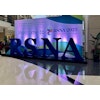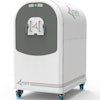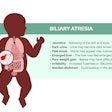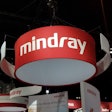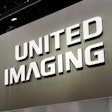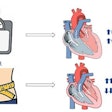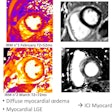
NEW YORK (Reuters Health), Dec 7 - Myocardial contrast echocardiography (MCE) is superior to nitrate-enhanced SPECT in predicting cardiac death and other cardiac events after acute myocardial infarction, say researchers from the U.K. in the November 1 American Journal of Cardiology.
"Because of its better spatial and temporal resolution, MCE is likely to provide more accurate information," Dr. Roxy Senior from Northwick Park Hospital, Harrow, told Reuters Health. "However, larger studies must be performed for it to achieve widespread use."
Dr. Senior and colleagues evaluated whether determination of myocardial viability with MCE is comparable to that with SPECT for the prediction of cardiac events after acute myocardial infarction. The contrast perfusion index (CPI) was created to represent the extent and intensity of residual infarction and residual myocardial viability on MCE.
Ninety-nine patients underwent both studies. In multivariate analysis, independent predictors of cardiac death included increased age, mean coronary luminal diameter stenosis, and an elevated CPI, the authors report.
The only significant predictor of cardiac death or nonfatal acute myocardial infarction on multivariate analysis was an elevated CPI.
Receiver operator characteristic curves showed CPI to be superior to SPECT perfusion index for predicting death and death or acute myocardial infarction, the investigators say.
"MCE is a unique technique because it can assess left ventricular function, extent and degree of residual myocardial viability, and myocardial ischemia at the site of the acute myocardial infarction or remote territory, all determinants of outcome, in a single examination," the researchers write. "It has several other advantages compared to radionuclide perfusion techniques, including portability, rapid acquisition, and no radiation burden."
"MCE is likely to be cheaper than SPECT," Dr. Senior said. "However, it is a relatively new technique which does require expertise. I feel a multicenter study is needed to establish its wider use."
By Will Boggs, MD
Am J Cardiol 2009;104:1184-1188.
Last Updated: 2009-12-04 19:36:18 -0400 (Reuters Health)
Related Reading
Screening kids with ultrasound, ECG finds cardiac abnormalities, November 17, 2009
Echo plus ECG team up to find heart flaws in athletes, November 16, 2009
Automated segmentation could improve fetal heart echo, November 6, 2009
Routine cardiac stress testing not advised for young adults, August 10, 2009
Copyright © 2009 Reuters Limited. All rights reserved. Republication or redistribution of Reuters content, including by framing or similar means, is expressly prohibited without the prior written consent of Reuters. Reuters shall not be liable for any errors or delays in the content, or for any actions taken in reliance thereon. Reuters and the Reuters sphere logo are registered trademarks and trademarks of the Reuters group of companies around the world.

